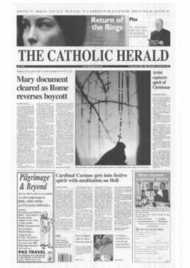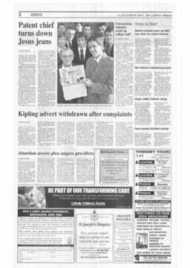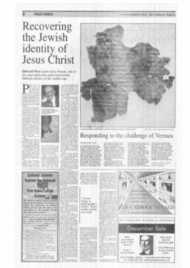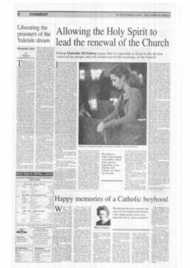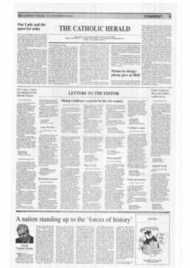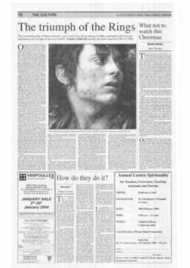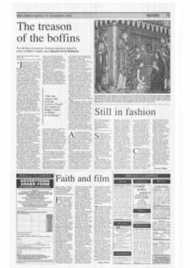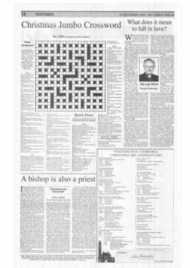Page 6, 19th December 2003
Page 6
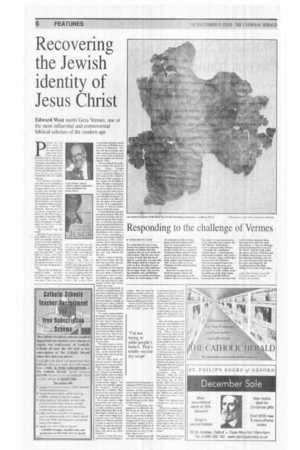
Report an error
Noticed an error on this page?If you've noticed an error in this article please click here to report it.
Tags
Share
Related articles
Jesus Through The Looking-glass
Lucy Lethbridge Talks To Geza Vermes About Jesus The Jew
Searching For The Real Jesus By Geza Vermes (scm Press,
Dead Sea Recriminations
Gospels' Openness To New Interpretations
Recovering the Jewish identity of Jesus Christ
Edward West meets Geza Vermes, one of the most influential and controversial biblical scholars of the modern age
perhaps no one alive since the first century AD can claim to know more about Jesus Christ the man than Geza Vermes. The former Professor of Jewish Studies at Oxford has just published The Authentic Gospel of Jesus, his fifth book on the subject, while his first, groundbreaking work, Jesus the Jew, was recently translated into an eighth language.
Over Belgian chocolates and coffee in the Oxfordshire home he shares with his wife Margaret and son Ian, as well as collie-cross Bobby (who tried to bite my leg off when I arrived), the professor reflects on five decades of searching. His bookshelves are a history of twentieth century progressive thinking — HG Wells, Einstein, Russell and TE Lawrence, alongside travel books on the Holy Land, a place that as a Jew and a Biblical scholar, Venues will always be drawn to. I compliment the Professor on his collie's sentry skills.
"He's a lovely dog," he laughs.
Then the 79-year-old academic ambles up to his bookshelf and proudly hands me Jezus 7yd, newly available in the language of the Pope. Was he worried about the reaction?
"Some people said, Will they keep the title?' I said I hope so. Jesus a Jew? The shock." Vermes speaks slowly and thoughtfully in a central European accent, his face never far from breaking into a smile.
"There is only one thing that could be worse — to claim that Mary is a Jewess! You would be killed." He laughs once more. "They were very nice, I can't tell you yet, because to my knowledge nobody has taken any notice. They told me, don't expect a quick reaction because this doesn't exist in Poland."
Vermes was born in Hungary in 1924, from a Jewish family that joined the Catholic Church when he was seven, a conversion that did not save his parents from the Nazis and their Hungarian collaborators, the Arrow Cross. The young Geza escaped their attentions thanks to the help of William Apor, Bishop of Budapest, who himself died months later when trying to protect a group of women from rampaging Russian soldiers (he was beatified in 1998).
Having entered the priesthood towards the end of the war, Geza Vermes (pronounced Ge-zar Vermesh) joined the Fathers of Our Lady of Sion, based in Belgium, while carrying on his studies of the Hebrew Bible. The letter accepting him into the college arrived the day he was due to leave town, caught up in the chaos of postwar Europe, one of many "providential accidents" he has ascribed to his life (it is also the name of his autobiography). It was indeed providential, for biblical studies were to shape his career.
It was around this time that an archaeological find that would revolutionise our attitude towards the first century was accidentally discovered, and soon named the Dead Sea Scrolls. Vermes became fascinated and devoted his doctoral dissertation to the subject in 1953, before publishing a hugely successful English translation in 1962. A halfcentury and several books later, and he is still fascinated by the subject — his latest work continues the search for the real man behind the Messiah.
But in a sense, I ask him, does it even matter who the real Jesus was, if his message is so powerful in itself?
"It depends on who asks the question. I am approaching the issue from a historian's background. And of course for a historian, yes, it matters. But I am not trying to undo people's beliefs, that's totally outside my scope."
Much of his latest book, as with previous publications, is concerned with the man who Vermes usually terms "the writer of the fourth Gospel". John has taken a bashing in recent years, often omitted From Bible classes altogether like the ugly sister of the New Testament.
"It is pretty understandable that people want to try to bring him down to earthly realities. For John, 1 upset some people by calling the Jesus of John as ET, which was not meant in a disrespectful way, but the idea of the Jesus of John is Eternal Word Creation, who at one stage lures himself among humans, and as soon as possible goes back.
"For this reason I don't believe that the Gospel of St. John, with a few big excep(ions, can be used for determining what sort of person was Jesus Christ."
On the other hand, the Gospel writer's defenders argue that it is the most beautifully written of the four.
But it is John the Evangelist's alleged anti-Semitism. rather than his style of writing ( or identity, for that matter), which make him such a controversial figure. "He speaks very harshly against the Voudaloi', which can mean Jew or Judaean. Then it goes to the extreme charge of saying that the Judaeans are the children of the Devil."
So to what extent is John responsible for later antiSemitism in the Church? "It certainly continues, unfortunately this is true. But on the other hand, I would say in the last half-century things have changed very, very substantially in the Christian attitude U) Judaism and the Christian attitude towards the not very nice things that past Christianity has had to say about the Jews."
And yet it took the worst atrocity in history for things to change. "But you need the Holocaust and the death of six million Jews to bring home the horror. Obviously I don't blame the Holocaust on John."
Vermes left the Church after studying the Dead Sea Scrolls, and formally joined the Liberal Jewish Synagogue of London in 1970. It was not, he says, a reverse Damascus moment, merely a growing out of organised religion. As for the Judaism of the author, it is perhaps not as strong as that of the man he has spent his life studying.
"I'm not attending synagogues as I'm supposed to do, but if you ask me what you are, I have a long Jewish ancestry. And I find in Judaism much that gives man his strength, then I find a great deal in the teaching of Jesus which I consider Jewish too. If I pray there is 700 acres of woodlands just next to me, that's where I pray."
Vermes' greatest legacy will have been to change our idea
of who Jesus the man was, his ideas on the Judaism of Jesus gaining common currency, 'even among senior figures in the Church. Next year sees the release of the first film to accurately show Jesus and his followers in their Jewish context, called, despite all the claims, The Gospel of St John. Vennes is surprised when told this.
But such is his impact that even the very definition of Jesus has been changed by Vermes. He laughs at the story: "When I retired my chair one of the editors of the new Word English Dictionary approached me and asked whether I will check all the entries in the dictionary which had a Jewish connection. Jesus was redefined as 'A Jewish preacher, regarded by his followers as the Son of God'. There was somebody from the General Synod of the Church of England, who was outraged by this. He found the idea 'a derogatory term'."
Certainly it was a bit of a comedown from "the Messiah". "Well, The Times had great fun, with the headline `Jesu, joy of man's divide'. But, of course, my name is not mentioned in the Jesus entry. In a funny way my greatest impact on literature will be in a publication in which my name is not mentioned."
What is his attitude to the Church now, after all these years?
"When you examine the attitude first of all of enlightened Christians and later on with the Second Vatican Council, it's such an enormous improvement that one must not go back to the old grumbles, and I live with a much more optimistic view than before."
The Authentic Gospel of Jesus is published by Allen Lane
blog comments powered by Disqus


